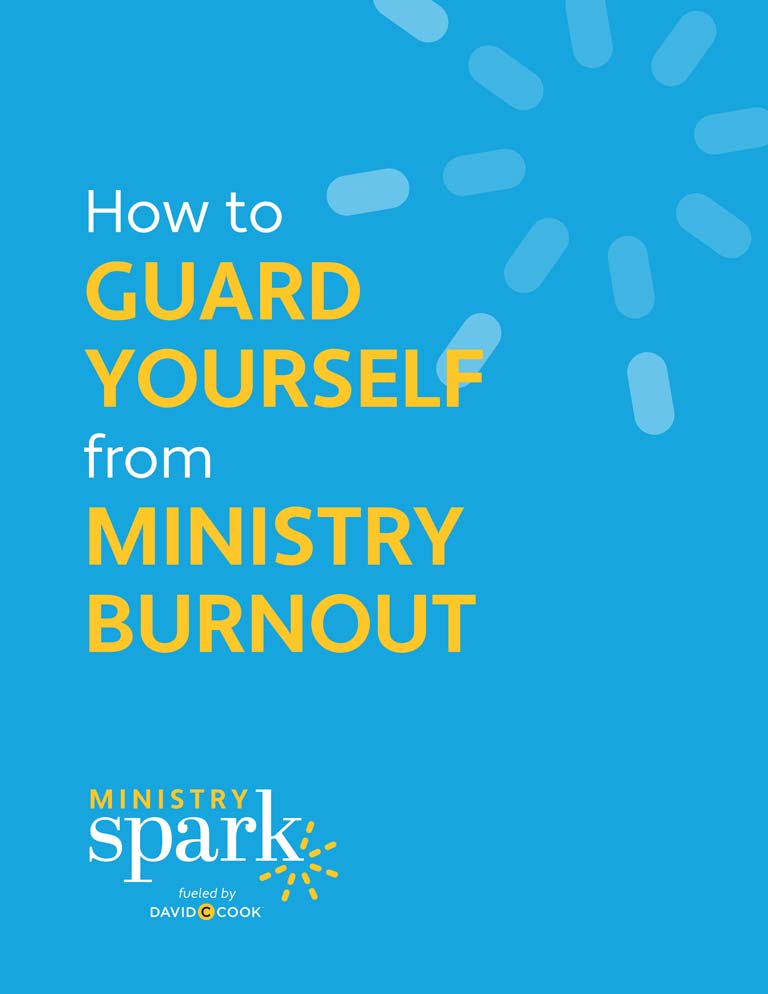Congratulations! You’re a children’s ministry leader! Maybe you’re sitting at the desk in your new office (or in a makeshift office), or maybe you’re reading this before you’ve even started at your first church.
You might have been thrown into (or fallen into) this role after volunteering in children’s ministry and realizing your passion for it. Or you might be someone whose calling to children’s ministry has been clear for a long time and have spent time preparing for and dreaming of this role.
Children’s ministry is one of the most important ways we get to serve God and spread the gospel to an entire generation of disciples!
I remember when I first felt the call to full-time children’s ministry as a teenager.
I had just been recently saved, and I committed to spend my life serving God however He would use me. Then, I spent the next four years studying children’s ministry in college and preparing for the life calling I felt.
New Ministries Are Challenging and Exciting
Regardless of how you got your start in children’s ministry—and whether or not you have a “ministry” background with training and preparation—this role is one that will inspire you, challenge you, and grow your faith and dependence on God.
Even with all the amazing classes and lessons I learned from professors and mentors in college, I was not prepared my first year of children’s ministry. It was scary, challenging, humbling, and wonderful all at the same time.

When you first start in children’s ministry, it’s normal and okay to feel a big range of emotions—from excited to scared to uncertain … or even to skeptical. Whether you’re feeling confident or nervous or a little of both, we want to help you succeed in your first year—and in all the years to come!
Children’s ministry is one of the most important ways we get to serve God and spread the gospel to an entire generation of disciples!
Here are some resources to help get your ministry journey started on the right track by focusing on some of the most important things to know and do!
Know Why You’re in This Role
Whether you stumbled into your role without planning and preparation, or you’ve been preparing for years, the most important thing to remember is: God put you here.
He has a plan for you as a children’s ministry leader, and all you have to do is let Him lead you and guide you.
This role isn’t only a job—whether you are a paid staff member or a volunteer, you have received a calling. Children’s ministry gives you an amazing opportunity to impact and influence a generation of world changers.

You will plant seeds you may not see sprout and grow; but even if you don’t immediately see the impact you have on the kids you serve, God will use you to make a difference.
You will be a reflection of Christ and His love to the kids, parents, and volunteers you serve.
Knowing and believing that you are called and that you are in this role for a purpose are the most important things to know, and they will be what get you through the difficult seasons in ministry and keep you from burning out.
Whether you are a paid staff member or a volunteer, you have received a calling.
My Story
When I got my first full-time job at a church as a children’s pastor, I was 22 years old, just out of college, and in a city 600 miles from my home. I didn’t know a soul. I was in a 100-year-old church with over 500 people, and the children’s ministry had a great legacy and history.
So I had large shoes to fill, and I was walking with great uncertainty.
The lead pastor told me that even though I was young, I was there because they believed in me and because God had made it clear that I was the right person for the role.
That didn’t mean I wouldn’t make mistakes or need to learn and grow (I most certainly did!), but I felt a confidence in knowing God had put me right where He wanted me, and He would equip me.
Build Relationships
In your first few months at a new church, it’s important to spend a lot of time simply getting to know people. So ask lots of questions, take people to coffee, and learn the church culture.
Research the church’s history and, specifically, the history of the children’s ministry. Ask parents, volunteers, and staff about their dreams and goals for the church and children’s ministry.
Talk to current and previous children’s ministry volunteers to find out what they’ve done before, what has worked, and what hasn’t worked.
And be intentional about building relationships: with kids, parents, volunteers, and with the staff you’re serving alongside.

While you’re in this intentional relationship-building phase, take notes and make assessments of where the children’s ministry currently is and what changes need to be made.
Once you understand the culture, desires, and needs of your church, you can assess any changes that need to be made. But don’t give into the temptation to make any significant changes right away.
Don’t Assume That What Worked in Another Church Will Work Now
Every church is different. Therefore, ideas and programs that you’ve seen work in other churches may not work in your new church.
Being open and flexible in your role is so much more than just programming and curriculum; it’s learning to understand the church, the people, the culture, and the history of that church.
My Story
When I started at my first church, I had to get to know an entirely new culture.
I was a Yankee transplanted from the Midwest to a college football town in the Deep South. And I mean the people were not just fans of college football; they were crazy for it.
I had to learn all sorts of things: what the phrase “Roll Tide” meant, not to schedule any church activities on game days in the fall, what colors not to wear on certain weekends, and what a “meat and three” restaurant is.
I learned more than new vocabulary though: I learned how people from the South greet each other; how they handle conflict differently than people from the Midwest do; and how they love history, legacy, and tradition in churches.
I had to be flexible and adaptable and willing to try and understand, with humility, things that were new or different.
Understand What a “Win” Looks Like
Be sure to clarify expectations and make sure you understand what your lead pastor (or direct manager) considers a “win” in your role for the next three months, six months, and year.
Then once you’ve determined what needs to be changed or improved, you can set goals for each quarter and make a plan to accomplish them.
It can be tempting to want to overhaul the children’s ministry and make a lot of big changes in the first year, but it’s wise to wait on big changes until you have a firm grasp on the needs and culture of the church and have built solid relationships with people.
Build a Strong Team
Without clear and defined roles, it will be impossible to build a strong team. So, before you build your team, clarify and write down the job description for every role you want to fill.
Once you know what you need, begin building your team.
If you walk into a situation without a lot of volunteers or a solid volunteer structure, you can make building a strong children’s ministry team one of your first goals.
Set reasonable expectations to build your team one person at a time.
In those first few months as you’re getting to know people, pay attention to their gifts, skills, passions, and experience. Then invite people to serve and join the team in a role that utilizes their gifts and passions.
It takes twice as much effort to recruit new volunteers as it does to retain current volunteers.
Don’t be afraid to invite others to volunteer. You can multiply the impact of your ministry if you follow some simple recruiting guidelines. People want to be a part of something meaningful and life changing.
As you invite people to join the team, make a plan for keeping them. It takes twice as much effort to recruit new volunteers as it does to retain current volunteers.
So set your volunteers up for success by providing training, communicating clearly, developing your team, and giving them the boost they need by showing genuine appreciation.
My Story
Six months into my first job, I felt like I was alone in a big room of 50 kids on Sunday mornings.
I was running the tech and sound booth, leading worship, teaching the message, running check-in and greeting families, and running security … almost all by myself.
I was running around frantically every Sunday looking stressed and too busy to talk to anyone or enjoy the services. I remember saying, “I just can’t do all this! How do I get more volunteers?”
I did eventually recruit one new volunteer, then another, and another. I learned to not hate the task of recruiting volunteers. And I learned to delegate and lead well. And by the end of my time there, the volunteer team had grown to more than 200 volunteers.
Create a Safe and Nurturing Environment
Safety is an incredibly important aspect of children’s ministry. If parents don’t trust you to keep their kids safe, you won’t have the opportunity to share the gospel with their kids.
Evaluate your church’s safety and security policies and procedures. Talk with your senior pastor and look at your church’s insurance to see what safety policies are required at your church.
Do a safety evaluation to see where your children’s ministry can improve in the areas of safety and security.
If parents don’t trust you to keep their kids safe, you won’t have the opportunity to share the gospel with their kids.
Here are some basic safety policies to implement and enforce in the children’s ministry.
- Check-in/check-out systems
- Volunteer application process (including background checks)
- Teacher/child ratios in all the classrooms
- A minimum of two unrelated adults per room
- Safe restroom policies
- Emergency action plans
Be proactive in planning safety and security for your children’s ministry! And keep in mind that it will be important for you to communicate the “why” behind each policy and ensure that the procedures are followed for the safety of every child and family.
Your children’s ministry doesn’t have to look like Disney World, but it does need to be clean, organized, and welcoming. Therefore, make it a regular practice to assess and improve the environment and atmosphere:
- All the classrooms are clean and organized.
- Hallways are well lit and clean.
- Supply closets are well stocked and organized.
- Easy-to-follow signs lead new families to and through your children’s ministry.
- The check-in area is well marked and welcoming.
My Story
I remember my first Sunday in a new church where I had come in to observe and evaluate. The volunteer who had been running the children’s ministry in the interim said at the end of class time, “All right, kids! See you later!”
Then the kids all ran out of the building (the children’s ministry was in its own building, across the parking lot from the main worship building) and ran across the parking lot to find their parents. I almost had a heart attack!
By the next Sunday, we had implemented a check-in and check-out system.
It took months of communication and conversation to help parents and volunteers recognize the value and importance of the system. But knowing where each child was and who they were with was more than worth the investment.
Choose a Curriculum
If your church is already using a curriculum that works for them and people are happy with, you may not need to make changes.
If you do decide to look for a new curriculum, be sure to get the input of your teachers and volunteers. No curriculum is perfect—you will probably need to do some tweaking to make it fit for your church.
There are a lot of things to consider when choosing a curriculum, but even the best curriculum can’t change lives: God changes lives through His Word—and with the help of dedicated and loving volunteers who serve with the kids and build relationships with them.
You can request samples of several curricula so you can test and compare them. Furthermore, to learn about the children’s ministry curriculum and resources David C Cook offers (and to get free samples), click here.
God changes lives through His Word—and with the help of dedicated and loving volunteers who serve with the kids and build relationships with them.
While you’re evaluating any curriculum for your ministry, there are many things to consider. You can use this checklist to help guide your curriculum selection process.
Curriculum Evaluation Guide
- What is the demographic of the kids, families, and volunteers in your ministry? Do you have mostly unchurched kids? Are the kids biblically literate?
- Are leaders or teachers consistent or rotating?
- Does it work with the model you use? Sunday school classroom? Rotation? Large group? Large group/small group?
- Evaluate the scope and sequence (the schedule/chart of what the curriculum teaches when). Does it cover the major Bible stories? Is it chronological? topical? Are the lessons age appropriate? Does it fit with your teaching calendar and the seasonal calendar?
- Is the curriculum Bible-centered and gospel focused? Do the activities and games point to Jesus and reinforce the teaching? Is each lesson actually from the Bible? Does the curriculum clearly articulate the gospel?
- Is it fun, engaging, and age appropriate? If you’re teaching the best content in the world but kids are bored, they will check out. Good curriculum can help you engage kids and make sure you’re bringing the Bible into and making it a part of their lives.
- Is it fun for kids? Are the lessons hands-on with lots of experiences for kids?
- Is the curriculum easy to use and adapt? If it’s hundreds of pages and requires 30 hours of prep each week, with more supplies than you can afford, it’s not going to be easy for you or your volunteers.
- Is it in a format that works for your church? If not, can you adapt it? Is it video driven or teacher led?
- Does it include everything you need? Parent resources? Volunteer resources? Media? Worship? Decorating tips?
- Is there material for all the kids in your ministry? Preschoolers? Elementary kids? Preteens? Special needs?
- Does it fit your church’s theology and teaching? Is it denominational or ecumenical? Most importantly, is it true to God’s Word?
Rest and Care for Your Soul
Maybe the most important thing to do in your first year of children’s ministry is this: take care of yourself. Keep your own cup filled by spending time with God regularly.

A healthy children’s ministry comes from the overflow of your own growing relationship with God.
Make sure you’re attending worship regularly in the main church service, you’re involved in a community group or small group, and you have a mentor or safe friend who can pray with you and hold you accountable.
A healthy children’s ministry comes from the overflow of your own growing relationship with God.
Schedule vacations and time off to rest and recharge. If you want to stay in ministry for the long haul, rather than burn out, you need to make it a priority from the beginning to rest and care for your own soul.
You can serve well AND keep your sanity.
Build a network around yourself: in your church, in your community, and in the broader children’s ministry community.
You can guard against being lonely in kids’ ministry by creating a safe place for relationships within (and beyond!) your church walls.
There’s a thrill that comes with going fast, but there is also a danger. So, as ministry leaders, we must know how to slow down and when to completely stop. Knowing this—and practicing it—is essential to caring for our souls.
My Story
I remember sitting in my office after my first parent meeting a few months into my first children’s ministry job. It had not gone well, and I remember crying and feeling hopeless, discouraged, and completed deflated.
I wanted to quit. But I took a few days and spent time alone with God (this isn’t always possible for everyone, I know, but carve out as much time as you can), and I felt God give me a sense of overwhelming peace and a renewed dedication to my role.
I felt hope that God was working in me and in the ministry, and that He would empower me to handle every situation.
The difficult times I’ve experienced have helped me learn and grow, but one of the most important things I learned was to spend time with God and refreshing my own soul.
That practice has made all the difference to my ministry.
For More Training
You can plan to attend a children’s ministry conference, listen to ministry or leadership-oriented podcasts, read books or blogs, and find ministry mentors you can learn from.
And if you’re interested in joining a community of ministry leaders (including veteran ministry leaders) to grow and learn together, check out Ministry Spark Events!

How to Guard Yourself from Ministry Burnout

How to Guard Yourself from Ministry Burnout









